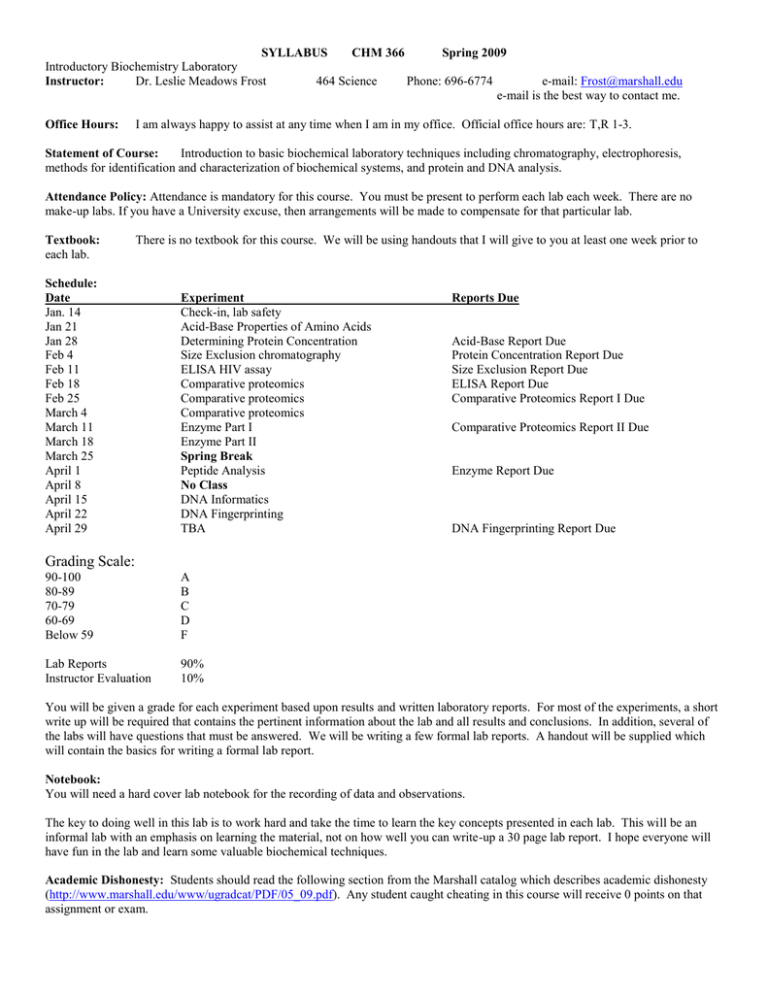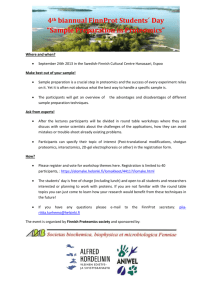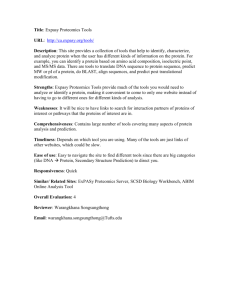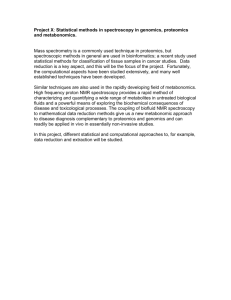Lab Reports 90% - MU BERT
advertisement

SYLLABUS CHM 366 Spring 2009 Introductory Biochemistry Laboratory Instructor: Dr. Leslie Meadows Frost 464 Science Phone: 696-6774 e-mail: Frost@marshall.edu e-mail is the best way to contact me. Office Hours: I am always happy to assist at any time when I am in my office. Official office hours are: T,R 1-3. Statement of Course: Introduction to basic biochemical laboratory techniques including chromatography, electrophoresis, methods for identification and characterization of biochemical systems, and protein and DNA analysis. Attendance Policy: Attendance is mandatory for this course. You must be present to perform each lab each week. There are no make-up labs. If you have a University excuse, then arrangements will be made to compensate for that particular lab. Textbook: each lab. There is no textbook for this course. We will be using handouts that I will give to you at least one week prior to Schedule: Date Jan. 14 Jan 21 Jan 28 Feb 4 Feb 11 Feb 18 Feb 25 March 4 March 11 March 18 March 25 April 1 April 8 April 15 April 22 April 29 Experiment Check-in, lab safety Acid-Base Properties of Amino Acids Determining Protein Concentration Size Exclusion chromatography ELISA HIV assay Comparative proteomics Comparative proteomics Comparative proteomics Enzyme Part I Enzyme Part II Spring Break Peptide Analysis No Class DNA Informatics DNA Fingerprinting TBA Reports Due Acid-Base Report Due Protein Concentration Report Due Size Exclusion Report Due ELISA Report Due Comparative Proteomics Report I Due Comparative Proteomics Report II Due Enzyme Report Due DNA Fingerprinting Report Due Grading Scale: 90-100 80-89 70-79 60-69 Below 59 A B C D F Lab Reports Instructor Evaluation 90% 10% You will be given a grade for each experiment based upon results and written laboratory reports. For most of the experiments, a short write up will be required that contains the pertinent information about the lab and all results and conclusions. In addition, several of the labs will have questions that must be answered. We will be writing a few formal lab reports. A handout will be supplied which will contain the basics for writing a formal lab report. Notebook: You will need a hard cover lab notebook for the recording of data and observations. The key to doing well in this lab is to work hard and take the time to learn the key concepts presented in each lab. This will be an informal lab with an emphasis on learning the material, not on how well you can write-up a 30 page lab report. I hope everyone will have fun in the lab and learn some valuable biochemical techniques. Academic Dishonesty: Students should read the following section from the Marshall catalog which describes academic dishonesty (http://www.marshall.edu/www/ugradcat/PDF/05_09.pdf). Any student caught cheating in this course will receive 0 points on that assignment or exam. “Policy for Students with Disabilities: Marshall University is committed to equal opportunity in education for all students, including those with physical, learning and psychological disabilities. University policy states that it is the responsibility of students with disabilities to contact the Office of Disabled Student Services (DSS) in Prichard Hall 117, phone 304 696-2271 to provide documentation of their disability. Following this, the DSS Coordinator will send a letter to each of the student’s instructors outlining the academic accommodation he/she will need to ensure equality in classroom experiences, outside assignment, testing and grading. The instructor and student will meet to discuss how the accommodation(s) requested will be provided. For more information, please visit http://www.marshall.edu/disabled or contact Disabled Student Services Office at Prichard Hall 11, phone 304-696-2271.”



